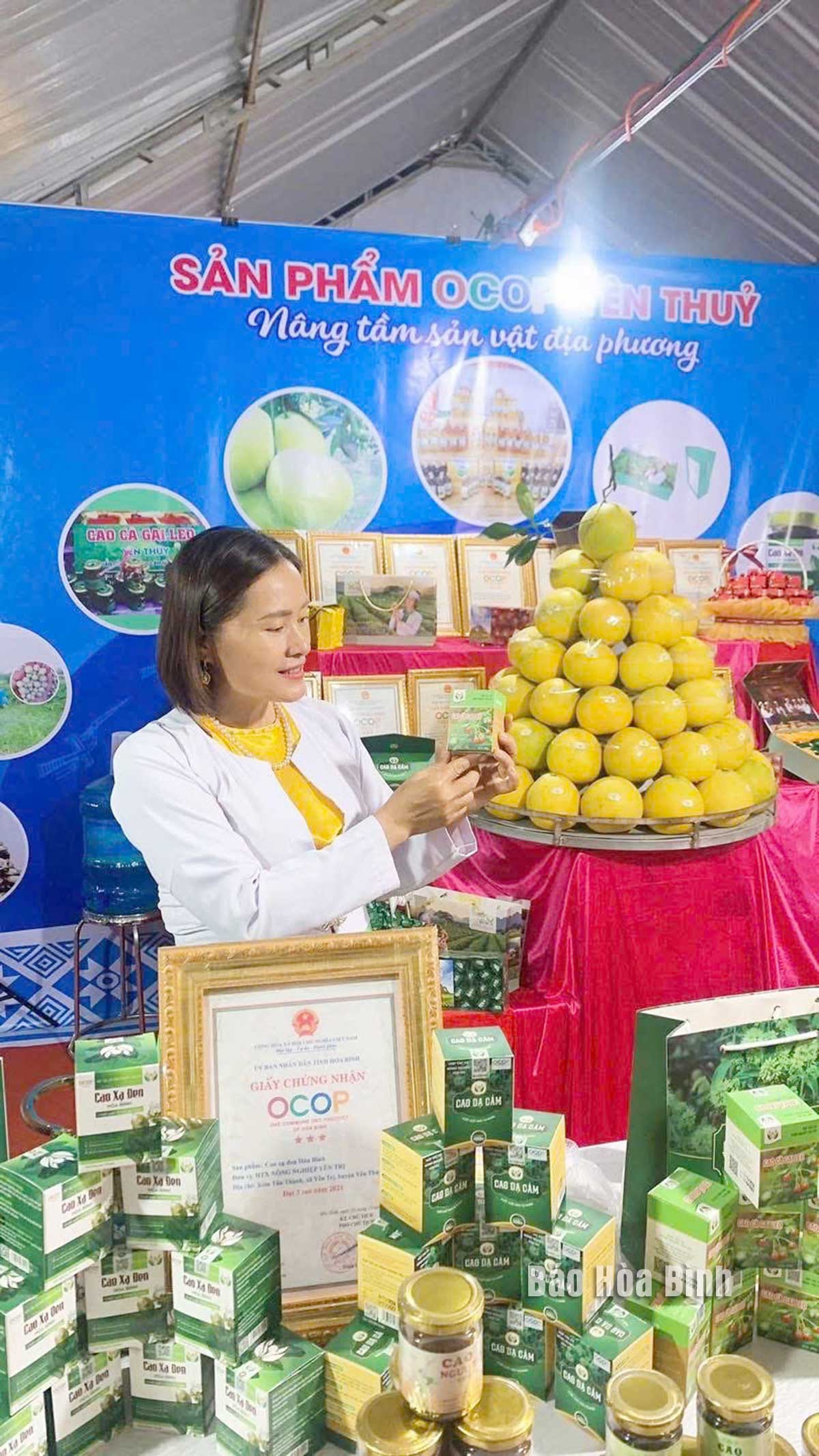
Maximizing local potential and advantages, Yen Tri commune in Yen Thuy district is actively promoting the cultivation of medicinal herbs and turning medicinal herbs into One Commune - One Product (OCOP) products.

OCOP products by Yen Tri Agricultural
Cooperative are promoted at the 2nd Da River Fish and Shrimp Festival held in
November 2024.
Chairman of the Yen Tri Commune People's
Committee Bui Phi Diep said that the economic value of medicinal plants is
tenfold higher than traditional crops like potatoes and cassava. So, local
farmers have prioritised the cultivation and expansion of medicinal herbs in
recent years.
Currently, approximately 15 ha of previously
unproductive land have been converted for medicinal herb cultivation, involving
over 140 households. This includes 6 ha of black licorice, 1 ha of "da cam” (Herba
Hedyotis capitellata), and 8 ha of other herbs. The annual yields reach over
450 tonnes, equivalent to 121 tonnes of finished products.
In addition to favourable climate and soil
conditions, Yen Tri has a strong network of traditional herbalists, numbering
around 50, including a nationally recognised herbalist. These practitioners
preserve and promote many traditional remedies, particularly for liver, joint,
kidney, and digestive ailments. The long-standing experience of Yen Tri
residents in cultivating and caring for medicinal plants creates favourable
conditions for sustainable development of both raw material zones and OCOP
herbal products.
The commune currently boasts two 3-star OCOP
herbal products - black licorice and "da cam” extract, produced by the Yen Tri
Agricultural Cooperative. Utilising modern extraction technology to preserve
medicinal properties, these OCOP products have earned the trust and high regard
of consumers both locally and beyond.
Despite these achievements, the sustainable development
of medicinal plants and OCOP products in Yen Tri faces challenges, including
unstable product markets and a lack of robust supply chains. Additionally,
post-harvest processing technology remains limited and unsynchronised.
Recently, the Hoa Binh provincial People’s
Committee has approved a project on piloting the development of OCOP herbal
products linked to local raw material zones in Yen Tri commune, creating
opportunities for sustainable growth for the locality.
The project outlines solutions to address
existing issues, including enhancing infrastructure, irrigation systems,
workforce training, modern technology transfer, and promoting trade and product
marketing. Strengthening partnerships with businesses to ensure stable product
outputs is also a priority.
The project also pointed out the need to explore
new product lines from medicinal plants, such as instant powders, tea bags,
herbal cakes, and herbal beverages.
The project is expected to support the expansion
of 36 ha of raw material zones with crops like black licorice, "da cam”,
"che vang" (Jasminum subtriplinerve), Jiaogulan, and 25 ha of buffer
zones for growing "ca gai leo” (Solanum trilobatum) in the neighbouring
communes of Da Phuc and Lac Luong.
This project will open promising prospects for
developing OCOP herbal products in Yen Tri, ensuring sustainable growth and
contributing to improving the living standards of the local people while
promoting its socio-economic development.
Since the beginning of this year, under the direction of the Department of Agriculture and Environment, the Sub-Department of Agricultural, Forestry, and Fishery Product Quality Management has strengthened the integration of the professional activities to promote and guide the organizations and individuals in the production and trading of agricultural, forestry, and fishery products to comply with the legal regulations regarding the use of chemicals, pesticides and veterinary medicines in crop cultivation, livestock farming and aquaculture. They also provide guidance to processing and manufacturing establishments on keeping the records to trace the product origins and using food additives from the approved list according to the regulations.
Hoa Binh province saw a significant rise in state budget revenue in the first two months of 2025, heard a meeting chaired by Vice Chairman of the provincial People’s Committee Quach Tat Liem.
Ha Thi Ha Chi, a 26-year-old graduate in law, has taken an unconventional path by returning to her hometown in Mai Chau district to establish the Tong Dau Cooperative, creating stable jobs for local women and bringing Thai ethnic brocade weaving to the global market.
As the Lunar New Year 2025 approached, pork prices surged, creating a profitable season for farmers in Tan Vinh commune, Luong Son district. Taking advantage of the rising demand, Can Minh Son, a farmer from Coi hamlet, sold over 30 pigs at 69,000 VND/kg, each weighing more than 100 kg. After deducting expenses, his family earned a profit of over 50 million VND.
alternate member of the Central Party Committee, Secretary of the Hoa Binh provincial Party Committee Nguyen Phi Long on March 5 had a working session with Yan Jiehe, Founder and Chairman of the China Pacific Construction Group, one of China's largest private corporations in the field of transport infrastructure. Deputy Secretary of the provincial Party Committee, Chairman of the provincial People's Committee Bui Duc Hinh and leaders of provincial departments and sectors also attended the working session.
The electronic printed circuit board (PCB) manufacturing and processing plant of Japan’s Meiko Group, located at Da River Left Bank Industrial Park in Hoa Binh city with a total investment of over 200 million USD, is expected to create thousands of jobs and make a significant contribution to the local budget.



